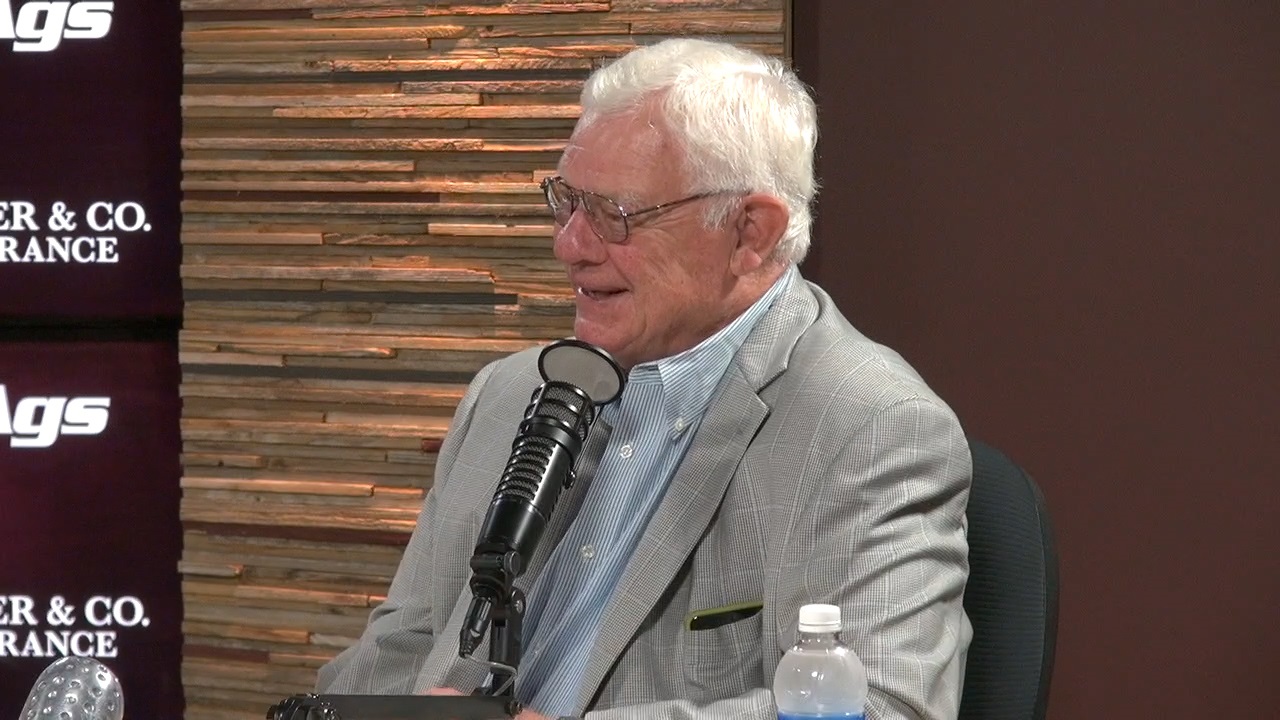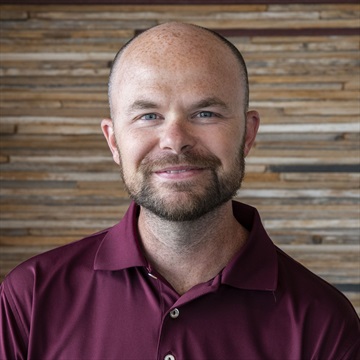
Aggie Flashback with Junction Boy and former OL Dennis Goehring
Key quotes from Dennis Goehring interview
“As a freshman under Willie Zapalac, I didn’t get to play. I was never really a player, and so when Coach Bryant comes, I ran down there to see if I was even on the team. So I go down there, and sure enough, I’m on the last team. Well, we go through spring training and – I thought spring training here was about as tough as it was in Junction, because he ran off a lot of guys here. So, when spring training’s over with, I’m still on the last team. I’m saying to myself, ‘Do I have a scholarship or not? I’ve just got to find out.’
"I went into his office, and he said, ‘What do you want?’ I explained it to him, and I said, ‘I sure would like to have a scholarship and come back. I know I’m on the last team.’ And he says, ‘That’s right. Not only that, I don’t want you. You’re not a football player.’ I did have a temper in those days a little bit. I just exploded. I jumped out of my chair and leaned over and said, ‘Okay blankety-blank, let’s make a deal.’ He says, ‘Well, what do you want?’ I said, ‘Let me come back this fall. If I make the team, you give me a scholarship. If I don’t make it, then you can kick me off.’ He said, ‘Okay, you’ve got a deal.’ Just that quick. Either I caught him at a good time or he just thought, ‘Well, we’ll run him off anyway.’”
“Junction was where I finally won Coach Bryant over. Of course, I’m thinking it’s going to be nice and cool, because I went to summer school out there the previous summer. It was cool at night in the barracks, and I’m thinking that’s better than the hot, un-air conditioned dorms. But boy, things come to a grinding attitude about a lot of things, and the coaches were just really aggressive. I had to wrap my hands up, so I went into the training room. The trainer, Smokey Harper, said, ‘Dennis, I think you ought to quit.’ I said, ‘Why?’ He said, ‘Coach doesn’t think you’re a football player.’ And I said, ‘Okay, here it goes again.’ So I went, ‘Blankety-blank, you go tell that S.O.B. that I’ll be here when you guys are gone.’”
“Out of all the Junction guys that came back, nine were engineers – six petroleum, two civil, one mechanical – eleven educators, including three Division I coaches, one Ph. D., two farmers and ranchers, four architects, two attorneys, one judge, one bank president, and a mayor and a veterinarian. So, that really represented a class that, not only did we make it through football, but we were academics too.”
“Frankly, I had no inkling that Coach Bryant was going to leave. I did not know that he was even considering leaving until it hit the press in Houston when we played Rice that day. We got beat 7-6, and we were No. 1 in the nation for Pete’s sake. There were a lot of us that wanted to say, ‘Why did you even open your trap?’ We were No. 1 in the nation and playing in the biggest game of our lives. One of the things he always said to us was, ‘You’ve got to take things as they go. Capture the opportunity when it’s given.’ He really didn’t like being at A&M. This was not a fun place to coach. All the other coaches in the conference were after him. They put him on probation because he was doing a better job than they were, obviously. Alabama was where he came from, and that’s where he wanted to go, so I don’t blame him. The only time he’d come down here before taking the job was when Kentucky played A&M.”
“I was just told he had an offer from Arkansas. Then he resigned from Kentucky, and by the time he got down to Arkansas – it was like a day or two – they changed their mind and he was without a job. Anyway, he was scouting around trying to get a job, and of course, he took this job. I don’t think he really realized that it was all Corps. I think he knew there weren’t any girls here.”
“When Bryant came to A&M, he graded all the Varsity, the existing football team. He graded every player. He was the first coach to grade every player. It was 2-out-of-3. If you were less than 66% good plays, that was failing. So what he was trying to do was just really get the guys tough enough to play the whole game and move on. Like my junior year, I averaged 54 minutes a game. Some games I never came out. The Baylor game my senior year, I never came out. He wanted somebody to stay in there and be tough.”
“Playing for Coach Bryant was a fundamental, gradual thing that you learned, just like going to class, except that you probably had a better attitude about being tenacious in what you want to do and not quit. I think that same attitude helped me survive a lot of business deals. Coach had offered me a job to go coach with him along with Gene Stallings at Alabama, but I didn’t want to do that. I had signed a contract with the Air Force, and I really wanted to be a pilot. I started flying as a freshman here at A&M. Just going through pilot training, you just do it. I think that helped, but more importantly, after I got into the business world, in particular the banking world, if I hadn’t had my backbone tight several times, I would have been run out. To me, it was just a function of having the tenacity and the courage and strength and ability to stay in the game, and the business world is the real game.”
“Coach Bryant went into a state of shock when we pulled into Junction. He went into a state of shock, because it was bad. I never did hear him say it directly, but I know that he fussed about it pretty aggressively. The summer school was out for three weeks already, and nothing was there. It was like a plowed field, really.”
“My senior year, the Baylor game was our turning point. Baylor had a great football team. Bill Glass was an All-American guard, and their tackle was an all-conference guy. I told our guard coach, ‘Coach, they’re going to kill me.’ He said, ‘No, you’ve got to kill them.’ I said, ‘Well, let’s design some tactics then.’ So what we did was design some stunts. Jack Pardee and Lloyd Hale were the linebackers. My position was just – don’t try to tackle anybody, but tackle Glass and the other guard and the center. Try to get all three of them muddled up to where they couldn’t block anybody else. They were thinking they were trying to block me, but I was just grabbing their helmets and everything I could pull down. Of course, that was the game I never came out in. They beat me up. They had to undress me, I was so beat up after that. It was worth it. We won the game, and that was the turning point.”
“I started the Bank of A&M, and this was really a capital-poor community. It was then. I was trying to get stockholders all over the country to put into the bank, so I said, ‘Alright, I’m going to do it.’ So, I called Coach Bryant. I said, ‘Coach, I’ve got this bank going, and I need some capital. I’d like you to buy some stock. He said, ‘Alright, how many shares do you want me to buy?’ My spiel for selling stock was about 200 shares for new professors, just to get people in there because they wanted to bank with me. I said, ‘Coach, if you take 200 shares, I’ll be happy.’ He had a cigarette voice, and he said a few cuss words. I said, ‘Oh gosh, I should have said 100 shares.’ He said, ‘Give me 1,000 shares.’ I said, ‘Alright!’ So, he bought 1,000 shares in the bank. It was $30,000, what he paid for it. When I called him up when we sold the bank, I said, ‘Coach, you now have $70,000, if you sell your stock.’ He said, ‘Alright, you did good.’”

